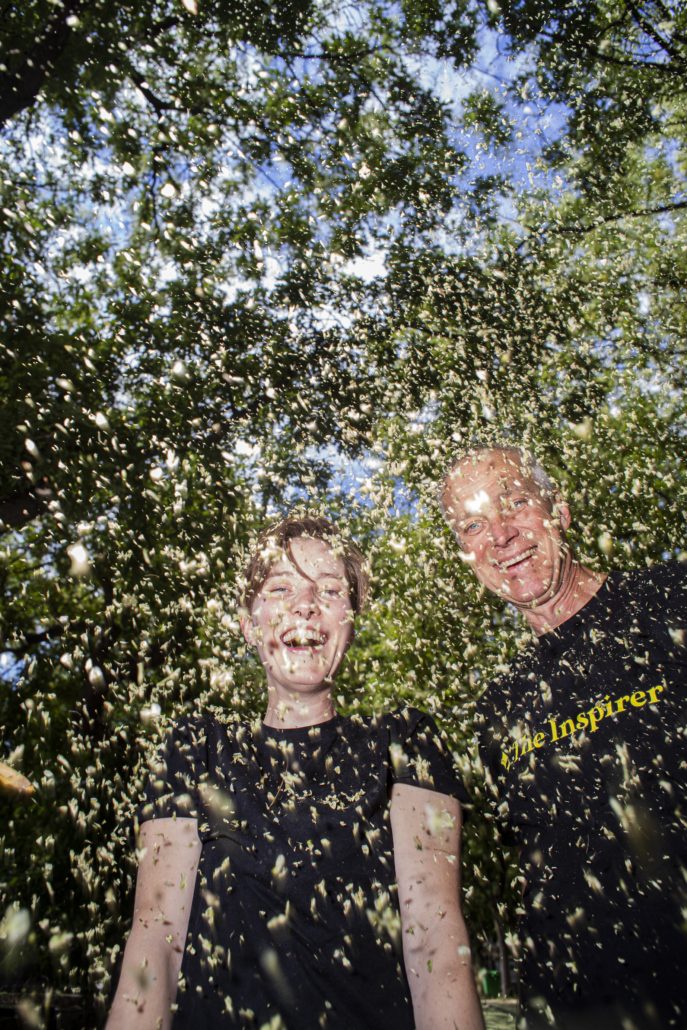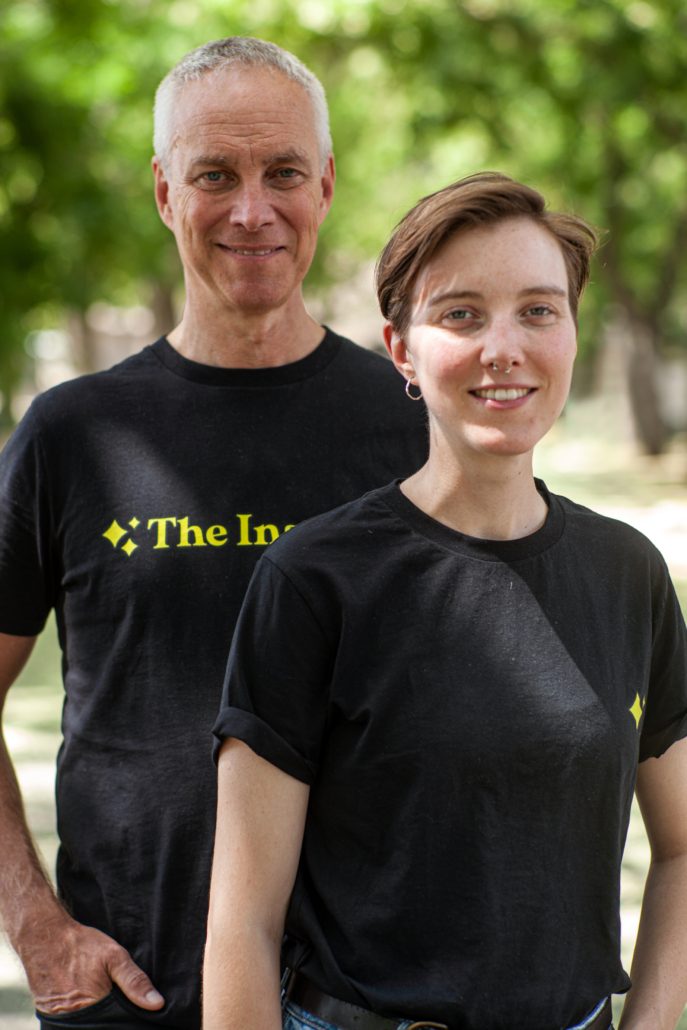 448
448  7 mins
7 mins The Inspirer was launched to transform the news into a force for good. “Never doubt that a small group of thoughtful, committed individuals can change the world. In fact, it’s the only thing that ever has,” said cultural anthropologist Margaret Mead. The founders of The Inspirer, Em and Kevin, are setting out to talk with the world’s committed individuals and tell their stories.
“I never imagined that I’d start a news service one day, much less with my father,” Em Barrett laughs. “But the more we talked about it, the more I saw that it made sense to do this together.”
Back in March 2020, Em, 26, had just decided it was time to start calling France home again. So they moved out of London, where they had lived since university.
Within days of arriving in Paris, President Macron declared “war” on Coronavirus on live TV. Everyone in France was essentially placed under house arrest as 100,000 police officers took to the streets, sometimes using drones and helicopters to keep people in their homes. Nobody ventured outside without official authorisation.
Unexpectedly, the walls of their small Parisien flatshare seemed to be closing in overnight.
That’s when Em decided to do something they would never have imagined.
After 10 years of living independently, they decided to move back in with their parents to the countryside outside of Paris. Em thought this might be a bit awkward. Still, it seemed better than waiting out an indefinite lockdown in Europe’s most densely populated city.
Tell me the world isn’t really “one big mess”
Once settled in, the days began to revolve around cooking, cleaning, working in the vegetable garden and checking the news. That relentless, overwhelmingly negative, 24/7 news.
The news became their only connection with the outside world. And it was bombarding them with an infinite loop of distressing stories. In addition to the Coronavirus, there was the climate, joblessness, possible food shortages, political chaos, bushfires…
There was an upbeat story from time to time, like the people in Italy banging pots and pans to applaud medical workers as they left their shifts.
But these stories were rare. Em could feel that “news fatigue” was setting in.
Doing the dishes one day as a panel of television experts droned on about the news in the background, Em’s father, Kevin Barrett, suddenly put down the plate he was drying. “I don’t think I can take this anymore,” he said. “These non-stop, doom and gloom news stories are just too much! All these news experts make it sound like the whole world is going to hell and that the only thing we can do is sit and wait for the next bad thing they will announce. It’s ridiculous. There must be somebody out there, somewhere, that is doing something constructive. Why don’t we hear about the people working to solve the problems? Why don’t we ever hear their stories?”
It was a “Eureka!” moment for both of them.
As they talked, they realised that dramatised pessimism was all over the news. They set out to find an antidote, craving a different kind of news. They wanted to hear the stories of inspiring people and get a more balanced perspective of what was happening in the world.

Photo by SOFIANE BOUKHARI
It all started with the question of mental health
Before the pandemic, Kevin had worked in the field of wellbeing. He knew the research – the physical shape of our brains can actually change depending on where we place our attention. Pathways in the brain get reinforced through repetition and, as the famous expression goes, “neurons that fire together, wire together.” London Black Cab drivers are a well-known example of how brains can grow and change quickly.
Kevin realised the inevitable impact of the never-ending lockdown news cycle on people. He was worried. Beyond the stress of the lockdown, could all this non-stop negative news also impact his mental health? As importantly, what impact was all this negative news having on the collective mental health of all the people around the planet? Were there any alternatives to all this negative news?
They decided to dig deeper. There are 8 billion in the world. If only one-half of one per cent were doing something to make the world a better place, that meant millions of people and countless stories. Where could they find these stories? Who was reporting on them?
The news’ dirty little secret
Amazingly, they found almost no reliable sources of positive news. “What we did discover is that the news media business model is mutating at digital speed,” Kevin explains, “and positive news is not part of that model. Smartphones have created a new phenomenon – ‘fast news.’ It’s a real thing. Fast news stimulates the brain’s reward system, like junk food or recreational drugs. What matters most to media organisations is grabbing people’s attention, driving them to their websites and keeping them there as long as possible. They do this by producing dramatic content, headlines and videos. And they’ve gotten very good at sensationalising even the most mundane stories. Click-bait ad revenue and data monetisation drive the news organisations’ businesses. Actually, it’s a dirty little secret because news organisations are obviously not reporting on it.”
“Fast News” is all about generating clicks and revenue with sensationalist headlines.
Kevin Barrett
What choice do we really have ?
“Let’s face it, we all need the news. We have a basic need to know what is going on in the world so we can make decisions about our lives and communities,” says Em.
“But something fundamental has shifted in the way that news is delivered. In the past, there was a public service aspect to the news. Today, media organisations profit from our basic need for news by generating content that keeps us hooked, coming back for more. You can test this yourself. Every time you return to the news for an update, you’ll find new, attention-grabbing headlines to click on. Having these stories in your mind gives you yet another reason to come back in the future. When you do return, you find additional worrisome headlines. It is almost malicious.”
“If it bleeds, it leads.”
Sensationalism has always been part of the media.
But today, the idea is being pushed to the extreme.
Catastrophe and crisis capture people’s attention
and keep them coming back for updates.
Kevin Barrett
“It’s really well established. Too much bad news can seriously affect a person’s body, mind and health. Just do a google search for ‘content moderator PTSD’, and you’ll see some extreme examples of negative stories’ cumulative effect. Yet despite that, we continue to let ourselves be hammered, every day, with problems we don’t own. And for some strange reason, we want to know more. It’s a vicious circle that leads to feelings of cynicism, powerlessness, stress, anxiety and depression, or worse! Tune into the news too often, and you’ll soon feel that the world is one big mess.”
“One thing we can say with certainty – the news media is definitely not designed with our wellbeing in mind,” laughs Em. “They are in the business of making money. So, like the people that we write about, we decided that we needed to do something to change all that.”
Understanding what it means to be wired for connection and action
“We started by doing outreach. Several small surveys helped us understand how people felt about the news. People told us that the news made them anxious, depressed or angry.”
“They also told us that they felt something was missing from the news, that the news was biased and didn’t tell the whole story. Almost everyone agreed and wanted to know more about the problems we face. And many wanted to know what they could actually do about these problems. People wanted to take action but didn’t know where to start. It seems that this is because we are wired for action. The desire to take action, however small, is one of the reasons that people click on “like” buttons on social media. Although it’s a small gesture, people want to show engagement.”
“Another thing we learned is that we are wired for connection. Remaining connected is tied to our very survival as a species. The I connections are vital to all of us. We look at others for social cues about how we should act. And when we see somebody taking a stand or trying to solve a problem, it stirs something in us. Just look at how people reacted to Ukrainian president Volodymyr Zelensky’s refusal to leave his country by saying, ‘The fight is here; I need ammunition, not a ride.’ Inspiring stories move us.”
“We began to tie this all together and saw two things. One is that there’s a real need for sources of inspiring news. And two, there’s a real opportunity here for someone who wants to offer people something different. All the people we spoke with wanted reliable sources of stories about people who are working to solve the problems that we face.”

Photograph by SOFIANE BOUKHARI
The Inspirer – stories carrying the seeds of inspiration and hope
The Inspirer is the news source that Em and Kevin launched to bring people fact-checked, inspiring news. They see The Inspirer as a platform to tell the stories of everyday heroes who see a problem in their community and decide they need to do something about it. It features the stories of people making a difference – sometimes big, sometimes small. “Hearing a single person’s story can sometimes be life-changing,” says Em. “Sometimes it is exactly what somebody needs to hear, at exactly the right time. People tell us that our articles make them feel like they can do something to make the world a better place. They see that change is possible.”
“Most of the stories that The Inspirer covers are actually hard to find. That’s because, apart from celebrities, inspiring people do not get media coverage. It’s almost a crime. We live in a time when our societies need to embrace transformational change and address massive, shared problems. Yet it’s almost impossible to find out what people are doing to improve the world. We want to put these stories on the front pages. Our stories cover many subjects, from the environment to civic engagement, education to youth initiatives to culture, and everything in between,” adds Kevin.
“By telling these stories, we also hope to channel some support to people who choose to take on big, emerging challenges. Tackling society’s biggest problems can definitely feel incredibly lonely. We believe that it is essential for the world’s heroes to know that they are not alone, that their efforts are important.”
“Each of these stories carries the seeds of inspiration or hope. That’s what we want to contribute. Let’s get this world back on track,” says Em with a very determined smile.
“We let them know they are not alone.
In fact, we go one step further,
we celebrate their journeys full of passion, ambition and perseverance!”
Em Barrett
Want to get involved with The Inspirer?
Check out The Inspirer website and reach out to Kevin and Em at contact@theinspirer.news. And remember to tell them if you’ve got an inspiring person tou think that The Inspirer should be talking to.
Also check out The Inspirer podcast series wherever you get your podcasts.
If you liked this article, you might also enjoy reading how a single woman launched a grassroots campaign that stopped the Japanese coal industry dead in its tracks.
Photo credit: all photos by SOFIANE BOUKHARI


 https://www.goldmanprize.org/wp-content/uploads/2021/04/Kimiko-Hirata-Photo_Goldman-Environmental-Prize-09-scaled.jpg
https://www.goldmanprize.org/wp-content/uploads/2021/04/Kimiko-Hirata-Photo_Goldman-Environmental-Prize-09-scaled.jpg